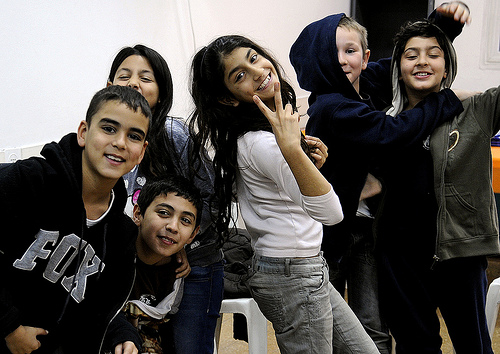
In the ever-competitive academic world we live in, students constantly strive to find a way to define themselves; they try to make themselves unique and stand out from the crowd. Well, what’s a better way to do this than studying abroad?
School Year Abroad (SYA) is a study abroad program for high school students founded in September 1964 by three of the finest American high schools: Phillips Andover, Phillips Exeter, and St. Paul’s School. Since then, SYA has sent hundreds of high school juniors and seniors to study abroad in unique and culturally rich cities and towns throughout Europe and Asia. Currently, SYA has campuses located in Beijing, China; Viterbo, Italy; Rennes, France; and Zaragoza, Spain. One of SYA’s primary goals is for students to fully immerse themselves into a culture they see interest in. The program utilizes a host family system, allowing students to stay with and become part of a local host family during their year abroad. This allows them to take part in the day-to-day culture and to experience the unique traditions of a country.
So why should you consider studying a year abroad? In the worlds of SYA, “high school is the best time, the most advantageous time to study abroad. High school students gain a sense of independence, develop critical thinking skills, practice tolerance and develop self-acceptance while living with a host family, meeting new friends and maneuvering around an unfamiliar city and learning to speak another language”.Not only does a SYA benefit high school students when transitioning in to college, but alsohelps to build life-long skills that are vitalfor success in the future. Students who study abroad are able to see the world from a different point of view; they can better understand international politics, easily grasp pressing socioeconomic issues, and become informed and global citizens of the world.
Not only does SYA allow students to acquire skills necessary for the future, but it’s also a major asset on college applications.Although many may have a perfect SAT score and outstanding grades, studying abroad truly gives many colleges a lasting impression and portrays you as a globally minded student. College admissions officers know that students who have studied abroad are likely proficient in a second language, culturally aware, and possibly more mature than their peers who haven’t had the same experience. Gabriela D’Addario, a graduate of SYA Italy,states, “Any high school student can study for the SATs, but not everyone has the courage and drive to live in a foreign country while still a teenager. Because you’ve had such a different experience than most high-schoolers, you offer a valuable perspective that will help round out any college class”.
Students at SYA are risk-takers, and that’s exactly what colleges love to see. Fred Hargadon, former Dean of Admissions at Princeton University,confirms, “In today’s hothouse atmosphere, a student’s decision to take part in a program like SYA signals to us just the sort of adventurous approach to life, just the sort of open and curious mind that seeks to take advantage of new opportunities and challenges, that we believe are essential to making the most of the great resources offered by Princeton. And they do this at no cost to themselves, either academically or with respect to the chances for admission to first-rate colleges”. Karl Furstenberg, former Dean of Admissions at Dartmouth College also states, "At Dartmouth we strongly support the SYA program because it demonstrates a student’s willingness to try something new”. It’s also shown that seniors who graduate from SYA have gone on to become part of great universities, many of whom attended Harvard, Yale, Dartmouth, Stanford, Brown, and Columbia (just to name a few).
Still, when considering going abroad for an entire year, students may fear possiblyfalling behind in schoolwork. However, this is definitely not the case at SYA. The program offers Advanced Placement (AP) courses as well as typical standardized testing (SAT, SAT II, ACT) to ensure that you’re back on track by the time you return back home. SYA also offers a wide variety of unique and interesting courses that students can choose from, including economics, archaeology, environmental science, Greek, Latin, art history, global issues, international relations and Spanish literature. SYA also provides numerous experiential learning opportunities to accompany classroom learning: For example, art history courses in SYA Italy focusonancient Roman and the Etruscan art in monuments and paintings that can be seen just a short drive away!
Evidently, having to get accustomed to a whole new culture, learn a whole new language, and interact with entirely new people during your most crucial years of high school is daunting. Students who do this are taking huge risks; however, this is the most unique part of the experience. Overcoming these barriers develops you mentally and physically, actively and effectively preparing you forfuture challenges. To conclude with the words of Michelle Obama, “Studying abroad isn’t just an important part of a well-rounded educational experience. It’s also becoming increasingly important for success in the modern global economy. Getting ahead in today’s workplaces isn’t just about the skills you bring from the classroom. It’s also about the experience you have with the world beyond our boarders- with people, and languages, and cultures that are very different from our own.”
If you’re interested and want to seek further information, visit SYA’s website at www.sya.org!
This article originally appeared in the April 2014 issue of UNIT-E. It was written by Ariana Lee, a student at the International School of Beijing.
About UNIT-E
UNIT-E was founded in the spring of 2010 with the aim of establishing a non-profit, student-run magazine for international students in Beijing. Staffed by current students from a range of international schools, the magazine provides an amalgam of cultural tidbits, fragments of Beijing student life, and a broad spectrum of unique perspectives from a diverse group of young adults.
Photo courtesy of US Embassy Tel Aviv (Flickr)



